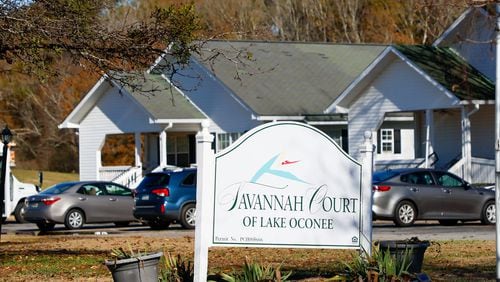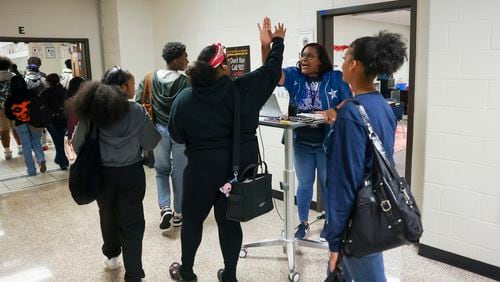Families and residents expecting a resolution to the future of Savannah Court of Lake Oconee, a Greene County personal care facility that faces possible closure after a series of state violations and breakdowns in care, could face at least two more months of uncertainty.
At the end of the three-day revocation hearing on Thursday, Administrative Law Judge Charles Beaudrot decided to forgo closing statements and instead have both parties send in written briefs with their positions, saying despite the long testimonies, he still did not understand the state’s position and reason for seeking to shut down the home.
“I will be very honest about this, I’m not real clear precisely the basis for the proposed revocation. And so I’d like to know exactly what the state’s position is,” said Beaudrot, later adding: “What I’m doing, in lieu of closing let’s just wrap it all into a brief and into a proposed order of findings of fact.”
He gave the state until March 8 to turn in their brief and then Savannah Court until March 29 to respond. Judges typically issue a written decision within 30 days of the conclusion of an administrative court hearing.
The extended timetable means the revocation process, which has already been pushed back twice, could last until the end of March. That would be nearly eight months since the state issued a revocation letter. Savannah Court received the notice in August after regulators with the Department of Community Health (DCH) found seven violations during a pair of inspections on July 31 and Aug. 1. Advocates and attorneys on Thursday expressed concern about the length of time for a resolution, pointing out that residents are left in limbo during this back-and-forth, despite a revocation notice seemingly implying major flaws.
“The decision to shut down a personal care home facility is a difficult one because it would displace the residents living there. The residents of Savannah Court, however, deserve better,” said Kate Hughes, an attorney with Wagner Hughes LLC, who filed a wrongful death claim against the facility last week on behalf of the son of a former resident.
“If this facility is not able to operate in accordance with the State regulations, the residents are living in an environment that is documented to be unsafe while the decision keeps getting delayed,” she continued.
Savannah Court was the subject of a recent investigation by The Atlanta Journal-Constitution that found more than 70 state violations since 2021, including the death of two residents and a sexual assault that occurred in October after the state had issued its revocation notice. The report highlighted problems with the state’s oversight of assisted living and personal care facilities and its lackluster enforcement of state regulations.
The state, in their Aug. 17 revocation notice, also alleged Savannah Court had broken the terms of a March 2023 settlement agreement, which had allowed the facility to pay nearly $10,000 in outstanding fines over a protracted period of time in exchange for certain requirements, like quarterly audits by an independent contractor.
Attorneys for Savannah Court maintain the settlement agreement was not broken, and that the state has not properly explained to them how they broke the agreement’s terms.
A closure hearing was originally scheduled for Nov. 1, but on Oct. 24 — two weeks after the sexual assault — Savannah Court requested that the court push back the revocation hearing because a settlement agreement was in the works, that would have allowed them to stay open. It would have been the third such agreement granted by the state since 2021.
A new hearing was scheduled for Jan. 3, the day the AJC investigation was published. While the two parties were still discussing a compromise agreement that morning, they ultimately reversed course and a hearing began that afternoon.
“The state’s position is that we’ve made repeated attempts to work with Savannah Court of Lake Oconee, we feel that it’s best at this juncture to move forward with the hearing and allow the court to make the ultimate decision,” Jason Reeves an attorney for DCH said at the time, explaining that he took Savannah Court’s suggestion — a year of independent monitoring — to his higher-ups and was told no.
Because of the delayed start, the hearing didn’t conclude that afternoon. It re-convened on Jan. 30 and Feb. 1. The court hearings finished Thursday afternoon with Judge Beaudrot asking for future written statements.
During the hearing, the state’s attorneys and attorneys for Savannah Court cross-examined witnesses from DCH, which regulates senior care homes in Georgia, as well as management at Senior Living Management, the Florida-based parent company of Savannah Court of Lake Oconee.
In 2020, following an Atlanta Journal-Constitution investigative series documenting similar inadequacies and accountability issues, the state passed a reform package to increase its fines and requirements of senior care facilities. Savannah Court’s high number of violations and the continued use of settlement agreements — which can soften penalties by breaking them up — raised questions about the state’s commitment, as well as its ability, to follow through with its promise to hold its 1,686 assisted living and personal care facilities accountable.
After the AJC’s original report in January, the paper was contacted by multiple individuals who had loved ones at Savannah Court but felt in the dark about what was happening or how the state was responding to violations. The piece documented an April 2023 incident where a resident was left for nearly six hours on the floor. His daughter only learned from the AJC that the staff watching her dad that day didn’t have competency-based memory care training, as is required by state law.
About the Author






